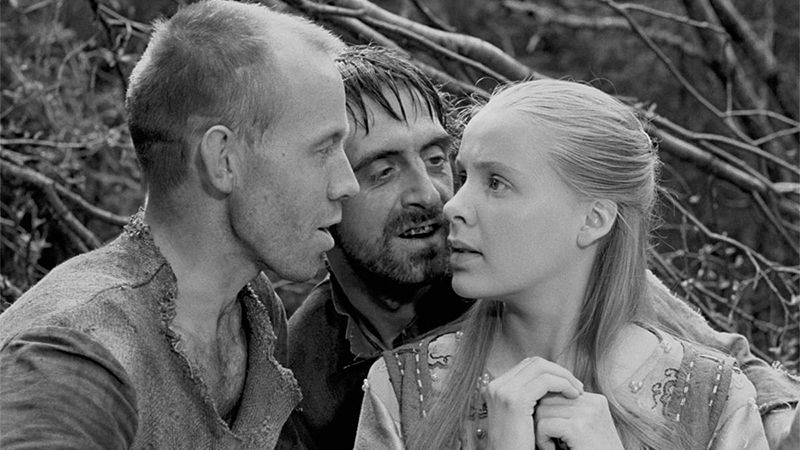The Virgin Spring (Jungfrukällan) [Blu-Ray]
Jul 10, 2018
In many ways, The Virgin Spring is a slight, almost rudimentary film’a sparse narrative of vengeance and atonement’but its very simplicity is what strikes chords. The narrative’s source is a 14th-century ballad ‘Töres dotter I Vänge,’ which Bergman had read as a student and had captivated him enough to cause him to entertain thoughts of turning it into either a ballet or a stage play. Once he saw its possibilities as cinema, he worked with novelist Ulla Isaksson to flesh out the characters and the historical details, but without diverging from the general narrative thrust of the sad ballad.
The story takes place in medieval Sweden and opens in the household of Töre (Max von Sydow) and Märeta (Birgitta Valberg), who are deeply religious Christians. That morning they send their favored daughter, Karin (Birgitta Pettersson), who is all blonde locks and girlish enthusiasm, on a daylong ride to the nearest church to offer votive candles to the Virgin Mary. Along with her is Ingeri (Gunnel Lindblom), Karin’s foster sister who is in every way her opposite. While Karin is bright, cheerful, and blissfully unaware of the realities of the world, Ingeri is dark, brooding, and all too cognizant of how the world works. Ingeri’s pregnant belly, conceived out of wedlock, is a constant and inescapable reminder of her shame. Not surprisingly, she resents Karin and her favored status, and early in the film she prays to the Nordic god Odin and puts a curse on her.
On the way to the church, Karin comes across three goat herders (Axel Düberg, Tor Isedal, and Ove Porath), with whom she offers to share her lunch. The two older herders, clearly aroused by her beauty and innocence, rape her and then kill her by striking her on the back of the head with a club. Ingeri, having separated from Karin, watches from a distance, as does the youngest of the herders, who is little more than a boy and has no power to stop his brothers’ violent actions.
After stripping Karin of her clothing, the herders move on, eventually ending up at the home of Karin’s parents. Unaware of where they are, they attempt to sell Karin’s bloodstained clothes to Märeta, who takes it as a clear sign that her daughter is dead. Once she tells Töre, he goes into a frighteningly controlled rage that erupts into unrestrained violence against the herders, including the young boy whose guilt lies in little more than not having been strong enough to stop the others.
Much has been made about the nature of religion in The Virgin Spring, about the way Bergman contrasts the dark, heathen pagan worship, which is associated primarily with a troll-like bridge keeper (Axel Slangus), and the devout, repentant nature of Christianity. Although Töre forgets the Christian principles of forgiveness when he learns of his daughter’s brutal death, thus allowing his darker inner core to take over, he realizes in the end the error of his ways and, in one of the film’s most moving moments, begs God for forgiveness. It is a moment of divine atonement, yet it remains vaguely ambiguous because the cathartic jolt of seeing Töre dispense human justice to the herdsman is in no way absolved by his quest for forgiveness.
In fact, if The Virgin Spring has a central organizing theme, it is the nature of guilt. Several characters each want to claim guilt for Karin’s death, including her mother and, most importantly, Ingeri, who realizes that Karin’s rape and murder represent the fulfillment of her darkest wishes. Töre never feels explicit guilt for the loss of his daughter, but he does feel it for his actions against the herdsmen, especially when he viciously slaughters the boy even though we get the sense that he realizes the child had little or no complicity. Yet, at that point, his rage has taken over and is, in a word, uncontrollable. In the pagan/Christian divide, it is the moment when the darkest recesses of Töre’s psyche, the part that would be fed by the mysteries and sexuality of heathen practice, bursts through the serenity of his Christian resilience. Even in our most genuine quest for God, Bergman seems to be saying, we remain forever, resolutely, and tragically human.
The Virgin Spring Criterion Collection Blu-ray
Aspect Ratio
1.33:1Anamorphic
NoAudioSwedish Dolby Digital 1.0 MonauralEnglish Dolby Digital 1.0 MonauralSubtitles
EnglishSupplementsAudio commentary by film scholar Birgitta SteeneIntroduction by filmmaker Ang LeeVideo interviews with actresses Gunnel Lindblom and Birgitta PetterssonAudio recording of Bergman seminar at the American Film InstituteInsert booklet with essays by film scholar Peter Cowie and screenwriter Ulla Isaksson, the text of the medieval ballad on which the film is based, and a letter from Bergman about the film’s rape sceneDistributor
The Criterion CollectionSRP
$39.95Release Date
January 24, 2006
COMMENTS
For the Blu-ray, we get the full 2K resolution of the transfer that Criterion made back in 2005 for their DVD edition, which was made from the original 35mm camera negative. Digital restoration has given the image a nearly flawless surface, with virtually no dirt or scratches anywhere. Detail in the image is extremely high, with great contrast and a smooth gradation of grays that does full justice to Sven Nykvist’s realistic cinematography. The disc comes with both the original Swedish monaural soundtrack and an optional dubbed English track. Both are clean and well-balanced, sounding quite good for their age.
All of the supplements that appeared on the earlier DVD appear here, as well. The audio commentary is by Swedish-born Birgitta Steene, a professor of film and Scandinavian studies at the University of Washington and author of Ingmar Bergman: A Reference Guide. Steene offers a great deal of lucid insight into both the making of the film and Bergman’s history as a filmmaker, as well as some intriguing information about Swedish history and culture that enriches the film’s medieval setting. Other supplements on the disc include a short introduction by director Ang Lee, who discusses the impact The Virgin Spring, his first ‘art-house movie’ viewing experience, had on him. There are also 20 minutes of new video interviews with actresses Gunnel Lindblom (who played Ingeri) and Birgitta Pettersson (who played Karin), both of whom reminisce about their experiences making the film and working with Bergman. Bergman’s only appearance is in 40 minutes of audio recording from a 1975 seminar at the American Film Institute. Lastly, the insert booklet contains essays by film scholar Peter Cowie (which is a slightly revised and expanded version of the essay he wrote for the Criterion laser disc edition) and screenwriter Ulla Isaksson, the text of the medieval ballad on which the film is based, and a letter from Bergman about the film’s rape scene
Copyright ©2018 James Kendrick
Thoughts? E-mail James Kendrick
All images copyright © The Criterion Collection
Powered by WPeMatico



